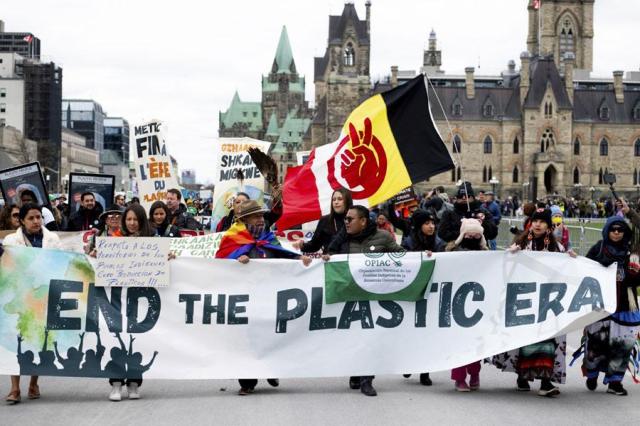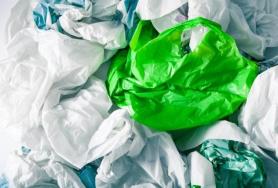
On this basis, in March 2022, nearly 200 nations endorsed a historic resolution to develop a new global and legally binding agreement or treaty by the end of 2024.
The global plastics treaty focuses on ending plastic pollution, not eliminating the use of plastics. The mandate specifies that the agreement should include the entire lifecycle of plastics, which spans resource extraction and production of materials through the design, sale and use of products, to the management of waste. However, as the latest crucial negotiations begin in Ottawa, Canada – from April 23-29 – the shape of the treaty remains unclear.
Divisive positions
Between the negotiations in Canada and a final round in Busan, Korea, in November, only 14 days of discussion time remain. The timeline is increasingly challenging. Negotiators must make rapid and significant progress this week towards a comprehensive treaty.
There is a broad division between countries, ranging from "low-ambition" countries which have hindered progress to a high-ambition coalition (led by Rwanda and Norway). This disparity means it is unclear where the treaty will land.
Will it be ambitious, with strict binding measures focusing on all stages of the plastics life cycle (including the "upstream" stages associated with resource extraction, manufacturing and processing)? Or will it be a weaker treaty, with voluntary and country-led measures that focus mainly on waste management and pollution prevention (the "downstream" stages)?
At present, unless consensus is reached, a small number of nations can veto or block the process. So this round of negotiations will need to overcome procedural delays and strive for a balanced approach that respects diverse national interests yet still produces a worthwhile treaty.
Voices in the room
There is ongoing dialogue regarding which voices are in attendance and influencing governments. Around 190 industry representatives were at a previous round of negotiations in Paris and 143 at the most recent round in Nairobi. The strong presence of industry and their ability to lobby governments continues to be a source of antagonism.
Some argue it is beneficial to have industry engaged in the process. Others say that the industry's substantial resources diminishes the fair representation and influence of civil rights and non-governmental organizations advocating for those who bear the brunt of plastic pollution. If industry has such a large presence, there is considerable work to be done to amplify the voices of civil rights groups, NGOs and evidence-based contributions from academics.
Financing implementation
How the actions identified under the treaty will be paid for still needs to be determined, and could be a major stumbling block. Without financial support, there is a significant risk that even well-intentioned measures could falter.
A well-structured financial framework could ensure transparency and accountability through a mixture of private and public finance or novel mechanisms such as plastic pollution fees. Financial institutions are already on board, but strong legal mandates are required to generate a favorable investment environment. Overcoming this hurdle will be mission-critical in Ottawa.
Shifting away from waste management
There is a strong argument by the petrochemical and fossil fuel industry and some lower-ambition countries that the treaty should focus on waste management, improved collection, recycling and removal technologies. But plastic production is so great that solutions to prevent or manage plastic waste and pollution cannot keep up, and will only reduce global plastic pollution by 7 percent in the long term.
Negotiators must instead be bold and tackle plastic pollution at source by setting binding targets to reduce production. A significant reduction and simplification of the toxic chemicals used in the production of primary plastic polymers themselves is another priority.
Targets for reduction should also fall on the manufacture of products, sale, distribution, import and export. Upstream policies to reduce non-essential plastics, new plastics, and harmful additives will increase reusability and recyclability. These are fundamental steps towards ending plastic pollution by tackling the cause, not the symptoms.
Reuse as a potential early victory
"Reuse" could feature in the treaty. Not to be confused with recycling or refill, reuse emphasizes the repeated use of items in their current form, curtailing the demand for new plastic production for single-use products or packaging. In certain applications such as packaging for food, drink, cosmetics and parcel packaging, it could eventually reduce plastic production by up to 75 percent.
Reuse would be relatively agreeable for most countries, especially when compared to divisive measures such as caps on production or outright bans on certain items or materials. These more contentious approaches can stall progress as they confront varied national interests and economic considerations. In contrast, agreeing to implement reuse systems in places such as restaurants or public buildings is an easy win in the context of very complicated political negotiations.
In Ottawa, negotiators will need to adopt a focused, cooperative approach, eliminating procedural delays to meet the pressing deadlines and critical requirements of the treaty, ensuring that time is used as efficiently as possible to achieve outcomes that do in fact help to end plastic pollution.
-------------------------------------------------------------------------------------------------------------------------
Antaya March is a lead researcher at Global Plastics Policy Centre, University of Portsmouth in England.
Cressida Bowyer is an associate professor in Arts and Sustainability at University of Portsmouth in England.
Steve Fletcher is a professor of Ocean Policy and Economy at University of Portsmouth in England.
This article was republished under a Creative Commons license with The Conversation. The views and opinions in this article are solely those of the authors.
https://theconversation.com/a-global-plastics-treaty-is-being-negotiated-in-ottawa-this-week-heres-the-latest-228432
Copyright ⓒ Aju Press All rights reserved.




